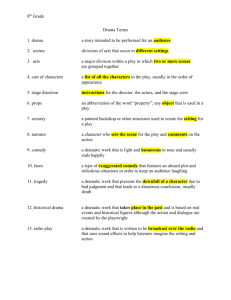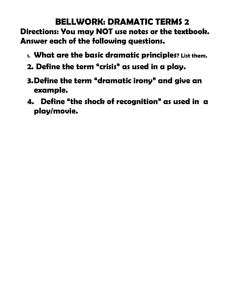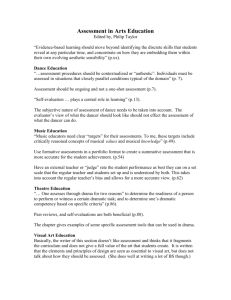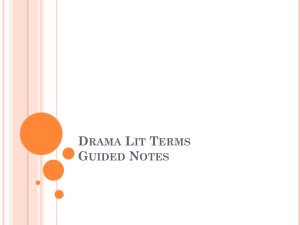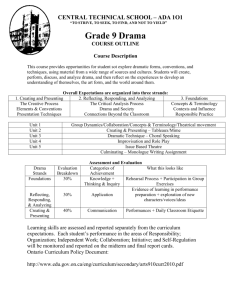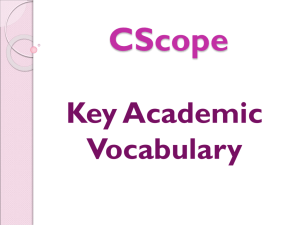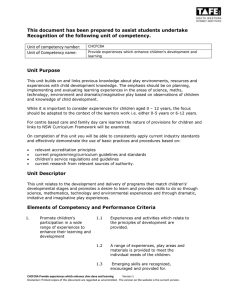Term 3 Overview Rooms 1, 2, 3, 4. KEY DATES Week 3: Wednesday
advertisement
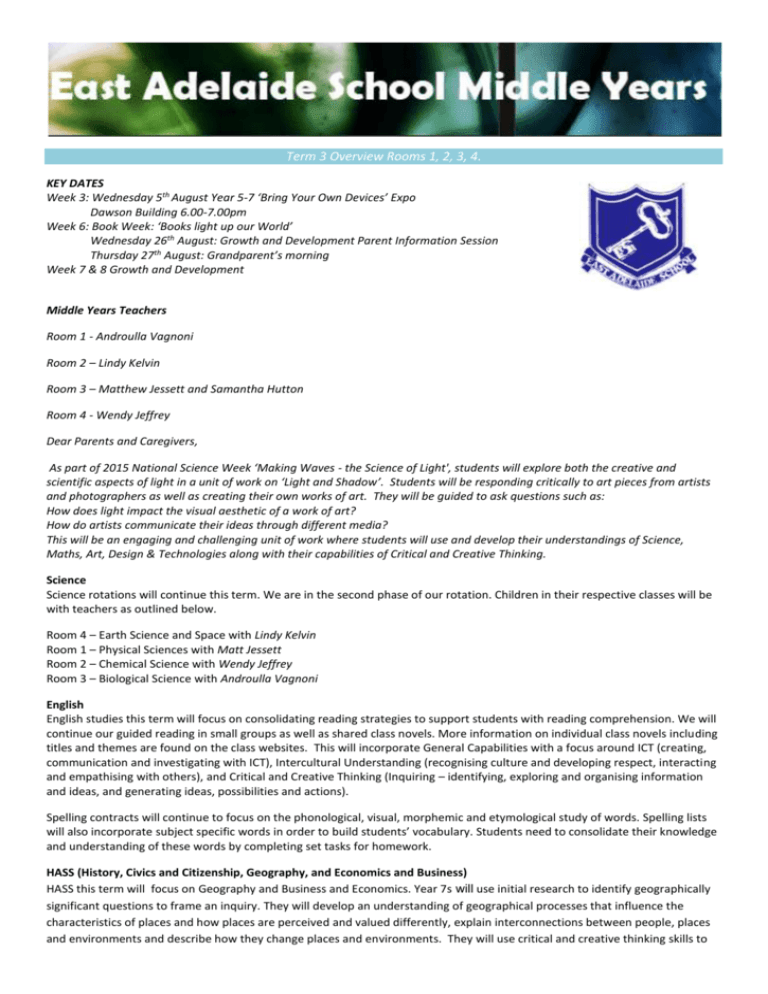
Term 3 Overview Rooms 1, 2, 3, 4. KEY DATES Week 3: Wednesday 5th August Year 5-7 ‘Bring Your Own Devices’ Expo Dawson Building 6.00-7.00pm Week 6: Book Week: ‘Books light up our World’ Wednesday 26th August: Growth and Development Parent Information Session Thursday 27th August: Grandparent’s morning Week 7 & 8 Growth and Development Middle Years Teachers Room 1 - Androulla Vagnoni Room 2 – Lindy Kelvin Room 3 – Matthew Jessett and Samantha Hutton Room 4 - Wendy Jeffrey Dear Parents and Caregivers, As part of 2015 National Science Week ‘Making Waves - the Science of Light', students will explore both the creative and scientific aspects of light in a unit of work on ‘Light and Shadow’. Students will be responding critically to art pieces from artists and photographers as well as creating their own works of art. They will be guided to ask questions such as: How does light impact the visual aesthetic of a work of art? How do artists communicate their ideas through different media? This will be an engaging and challenging unit of work where students will use and develop their understandings of Science, Maths, Art, Design & Technologies along with their capabilities of Critical and Creative Thinking. Science Science rotations will continue this term. We are in the second phase of our rotation. Children in their respective classes will be with teachers as outlined below. Room 4 – Earth Science and Space with Lindy Kelvin Room 1 – Physical Sciences with Matt Jessett Room 2 – Chemical Science with Wendy Jeffrey Room 3 – Biological Science with Androulla Vagnoni English English studies this term will focus on consolidating reading strategies to support students with reading comprehension. We will continue our guided reading in small groups as well as shared class novels. More information on individual class novels including titles and themes are found on the class websites. This will incorporate General Capabilities with a focus around ICT (creating, communication and investigating with ICT), Intercultural Understanding (recognising culture and developing respect, interacting and empathising with others), and Critical and Creative Thinking (Inquiring – identifying, exploring and organising information and ideas, and generating ideas, possibilities and actions). Spelling contracts will continue to focus on the phonological, visual, morphemic and etymological study of words. Spelling lists will also incorporate subject specific words in order to build students’ vocabulary. Students need to consolidate their knowledge and understanding of these words by completing set tasks for homework. HASS (History, Civics and Citizenship, Geography, and Economics and Business) HASS this term will focus on Geography and Business and Economics. Year 7s will use initial research to identify geographically significant questions to frame an inquiry. They will develop an understanding of geographical processes that influence the characteristics of places and how places are perceived and valued differently, explain interconnections between people, places and environments and describe how they change places and environments. They will use critical and creative thinking skills to describe alternative strategies to a geographical challenge and propose a response, taking into account environmental, economic and social factors. Year 6s will focus on the topic of a diverse and connected world. They will build their inquiry skills through research and investigate the diversity of people and cultures around the world, the indigenous peoples of other countries, and the diversity of countries across the world and within Asia. Mathematics Maths programs, aligned with ACARA continue with special focus on areas identified as posing the greatest challenge to our students, including analysing written problems and applying appropriate processes to finding the solutions. Students will be supported in using their mathematical knowledge and skills, specifically applying them to real life situations. Year 6 Patterns and Algebra Creating sequences involving whole numbers, fractions and decimals. Describe the rule used to create the sequences. Money and Financial Maths: Investigating and calculating percentage discounts on sale items, with and without digital technologies. Measurement and Geometry: Connecting decimal representations to the metric system Interpreting and constructing time table Constructing simple prisms and pyramids Converting between common metric units of length, mass and capacity. Solving problems involving the comparison of lengths and areas using appropriate units. Plotting ordered pairs using the Cartesian coordinate system in all 4 quadrants Investigating angles on a straight line, angles at a point and vertically opposite angles. Using the results to find unknown angles. Year7 Measurement and Geometry: Using units of measurement Calculating volumes of rectangular prisms Drawing different views of prisms and solids formed from combinations of prisms Statistics and Probability: Data Representation and Interpretation: Calculating, mean, median, mode and range for sets of data. Interpreting these statistics in the context of data Constructing and comparing a range of data displays including stem-and-leaf plots and dot plots Number and Algebra: Money and financial mathematics Investigating and calculating 'best buys', with and without digital technologies Patterns and algebra Introducing the concept of variables as a way of representing numbers using letters Creating algebraic expressions and evaluate them by substituting a given value for each variable Extending and applying the laws and properties of arithmetic to algebraic terms and expressions Technologies Design and Technologies Students will use a range of symbols and technical terms in a range of contexts to produce patterns, annotated concept sketches and drawings, using scale, pictorial and aerial views to draw environments. In Performing Arts students are writing and performing melodramas which will be filmed and produced as iMovies. Digital Technologies Students will investigate how digital systems use whole numbers as a basis for representing all types of data such as recognising that the numbers 0, 1, 2 and 3 could be represented by the patterns of two binary digits of 00, 01, 10 and 11. Students are encouraged to explore their creativity in a variety of ways. The use of ICT tools in the classroom can be an innovative and creative way to present information to a wider audience. Students will be using iMovie and other movie making programs to present information pieces; they will use an array of digital presentation tools to communicate their ideas; they will use online programs such as Khan Academy and Ted Ed Lessons to gain knowledge and practise skills. Homework Children will continue to have homework four nights a week, of approximately 45 minutes. Our strong focus on time management will continue this term and we expect all students to use their diary to help them stay on track with daily homework expectations. Students will be required to work consistently on various long term projects and assignments that have been scaffolded and initiated in class. Students will continue to have spelling contracts and may be required to complete unfinished class work. Students are also strongly encouraged to read fiction and non-fiction books, Lexiles and focus on the Premier’s Reading Challenge which concludes on September 4th this term. "(Teachers) negotiate with students how they will demonstrate their learning by directly linking to the intended learning outcomes.” SA TfEL - Teaching for Effective Learning Framework. "(Students) give feedback to others and accept it from people who are helping” (them). SA TfEL - Teaching for Effective Learning Framework. Specialist Teaching Areas: Italian Overview Years 6 and 7: Term 3 2015 - Grace Vottari The Italian Program will be structured around two main interrelated Australian Curriculum strands: Communicating and Understanding. In Term 3 students will explore a scientific text, L’UNIVERSO: I Pianeti (The UNIVERSE: The Planets) in support of the whole school integrated learning topic of LIGHT. Learning outcomes will be achieved from the following sub-strands. Communicating 1.1 Socialising: Interact and socialise with teacher and peers to exchange information about the Solar System. 1.2 Informing: Listen to, view and read texts and gather information from a range of sources about the Solar System. 1.3 Creating: Create imaginative texts for different audiences. Describe and illustrate an imaginary Solar System. 1.4 Translating: Create simple bilingual texts and discuss what translates easily or not. Understanding 2.1 Systems of Language: Use grammatical knowledge, to interpret and create meaning in Italian. 2.2 Language variation and change: Recognise that language use varies according to the contexts of situation and culture. Performing Arts (Larissa Maher) Concentration, improvisation and tableau activities Characterisation – stereotypes Melodrama – looking at the elements and structure of a traditional melodrama. In groups students will create their own melodrama which follows a more traditional structure and perform to the class. (Year 6) ACARA Outcomes: Drama –Develop skills techniques of voice and movement to create character, mood and atmosphere, and focus dramatic action. Rehearse and perform devised and scripted drama that develops narrative, drives dramatic tension, and uses dramatic symbol, performance styles and design elements to share community and cultural stories and engage an audience. (Year 7) ACARA Outcomes: Drama – Develop roles and characters consistent with situation, dramatic focus and performance styles to convey status, relationships and intentions. Plan, structure and rehearse drama, exploring ways to communicate and refine dramatic meaning for theatrical effect. Develop and refine expressive skills in voice and movement to communicate ideas and dramatic action in different performance styles and conventions. Perform devised and scripted drama maintaining commitment to role. Visual and Media Arts This term visual arts will continue to be incorporated into our integrated units within our classrooms. The focus will be on creating and responding to a range of art work using light and shadow. Students will explore ideas and practices used by artists and make aesthetic choices about representation and the use of visual conventions and processes. Health Year 6 and 7 students will participate in growth and development workshops offered by Kidz Biz Ed. All lessons will cover core social, personal and sexuality development education in accordance with the DECD Health & Physical Education Curriculum including puberty (physical and emotional), body image and media influences. Students will continue to participate in a regular fitness program focussing on health, safety and wellbeing through teamwork. PE (Aldo Perilli) Moving our body Practise specialised movement skills and apply them in different movement situations (ACPMP061) Side-steps/ Skipping/ Lunging Develop an understanding of using space and height Develop hand-eye-feet coordination in dance movements culminating in the performance of dance routines Understanding movement Participate in physical activities designed to enhance fitness, and discuss the impact regular participation can have on health and wellbeing (ACPMP064) Shuttle Runs/ Beep Test Develop skills to successfully engage in Athletics events. Develop skills to successfully engage in Table Tennis activities. Learning through movement Participate positively in groups and teams by encouraging others and negotiating roles and responsibilities (ACPMP067) Athletics Events: 100m; 200m; 400m; 800m; High Jump; Long Jump; Discus and Shot Put. Table Tennis skills and techniques. Develop partner work and tactics for playing as a team All lessons will be of 50 minutes duration with the following format: Fitness (approx.10 minutes) Skill Development (approx.25 minutes) Minor-Games-modified rules(approx.10 mins) Reflection (approx. 5 minutes) We will focus on ‘Moving Our Body’ - ‘Understanding Movement’ and ‘Learning Through Movement’, emphasising challenge and adventure activities: fundamental movement skills: games and sports: lifelong physical activities: rhythmic and expressive movement activities ENJOYMENT—FAIR PLAY—BE ACTIVE—COLLABORATION—LEARNING—FUN Extra-Curricular Opportunities Extra-curricular offerings include Tournament of the Minds, Chess, Debating, Maths Olympiad (group problem solving schools’ competition), and Orienteering. Community Service Students are encouraged to complete their community service booklets and record the hours they have spent on their leadership positions. A number of year 7 students have obtained their ‘Senior Badge’ after completing 10 hours of support for school-based activities. Year 6 students are working hard to fill their community service booklets, and will continue to get opportunities throughout the semester with road crossing duty and sports shed duty. Parental Support We need continued support to achieve required outcomes for our students with excursions this term. Because of mandatory regulations regarding adult/student ratios they cannot go ahead without trained volunteers. Please check our newsletters or school calendar for upcoming training days this term or see Linda in the front office for further information. We are all looking forward to a productive and rewarding term 3 and if you have any questions, comments, concerns or feedback please don't hesitate to contact us. Kind Regards, The Middle Years Team
